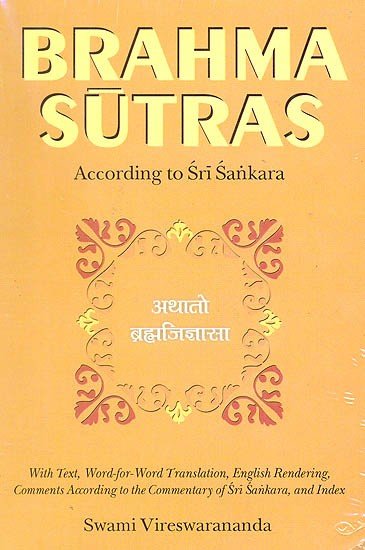Brahma Sutras (Shankara Bhashya)
by Swami Vireshwarananda | 1936 | 124,571 words | ISBN-10: 8175050063
This is the English translation of the Brahma-sutras including the commentary (Bhashya) of Shankara. The Brahma-sutra (or, Vedanta-sutra) is one of the three canonical texts of the Vedanta school of Hindu philosophy and represents an early exposition the Vedantic interpretation of the Upanishads. This edition has the original Sanskrit text, the r...
Chapter I, Section II, Adhikarana V
Adhikarana summary: The ruler within is Brahman
In the last topic, while interpreting the person in the eye as Brahman it has been taken for granted that the eye is prescribed in Brih. 3. 7. 18 as an abode of Brahman for contemplation, and that therefore here also the eye is prescribed as an abode. The present topic takes up for discussion this text of Brihadaranyaka and establishes the conclusion that was taken for granted in the last topic.
Brahma-Sutra 1.2.18: Sanskrit text and English translation.
अन्तर्यामी, अधिदैवादिषु तद्धर्मव्यपदेशात् ॥ १८ ॥
antaryāmī, adhidaivādiṣu taddharmavyapadeśāt || 18 ||
antaryāmī—The Ruler within; adhidaivādiṣu—in the gods etc.; taddharma-vyapadeśāt—on account of Its qualities being mentioned.
18. The Ruler within of the gods and so on (is Brahman) on account of the qualities of that (Brahman) being mentioned.
“Dost thou know the Internal Ruler” etc. (Brih. 3. 7. 1); and again,
“He who inhabits the earth, but is within it, whom the earth does not know, ... is the Internal Ruler, your own immortal self” (Brih. 3. 7. 3).
The “Internal Ruler” spoken of here is Brahman and not the individual soul endowed with Siddhis (powers) or the presiding deity, or anything else, for the characteristics of Brahman are mentioned in the concluding part of the text cited, wherein the Raler is spoken of as identical with the individual soul and immortal, which can be true only of Brahman. He is also described in this section as being all-pervading, since lie is inside and the Ruler within of everything, viz. the earth, the sun, water, fire, sky, the ether, the senses, etc., and this also can be true only of Brahman.
Brahma-Sutra 1.2.19: Sanskrit text and English translation.
न च स्मार्तम्, अतद्धर्माभिलापात् ॥ १९ ॥
na ca smārtam, ataddharmābhilāpāt || 19 ||
na—Neither; ca—and; smārtam—that which is mentioned in the (Sankhya) Smriti; atat dharma-abhilāpāt—because attributes contrary to its nature are mentioned.
19. And neither is (the Ruler within) that which is talked of in (Sankhya) Smriti (i.e. Pradhana), because attributes contrary to its nature are mentioned (here).
The Pradhana is not this “Internal Ruler”, as the attributes : “He is the immortal”; “unseen but seeing, unheard but hearing,” etc. (Brih. 3. 7. 23),. do not hold true of the non-iutelligent Pradhana.
Brahma-Sutra 1.2.20: Sanskrit text and English translation.
शरीरश्च, उभये'पि हि भेदेनैनमधीयते ॥ २० ॥
śarīraśca, ubhaye'pi hi bhedenainamadhīyate || 20 ||
śarīraḥ—The individual soul; ca—also; na—not; ubhaye-api—(the followers of) both (the recensions—Kanwa and Madhyandina); hi— for; bhedena—as different; enam—this (the Jiva); adhīyate—read.
20. Also the individual soul (is not the Ruler within), for this is read as different (from the Internal Ruler) by the followers of both (the recensions, viz. the Kanwa and Madhyandina Sakhas of the Brihadaranyaka Upanishad).
The negative ‘not’ is to be supplied from the last Sutra.
“He who dwells in knowledge” etc.—says Brih. 3, 7. 22, Kanwa reading, where ‘knowledge’ stands for the individual soul, for it consists of knowledge. “He who dwells in the self”—is the Madhyandina reading of the same passage, where ‘self’ stands for the individual soul. These quotations make it clear that in either reading the individual soul is spoken of as different from the “Internal Ruler”, for it is the ruler of the individual soul also.
Here again we should not forget that the difference of the Internal Ruler, the Supreme Lord, and the individual soul is merely the product of Nescience. There is only one Self within, for two selves are not possible. But owing to limiting adjuncts the one Self is treated as if It were two.
